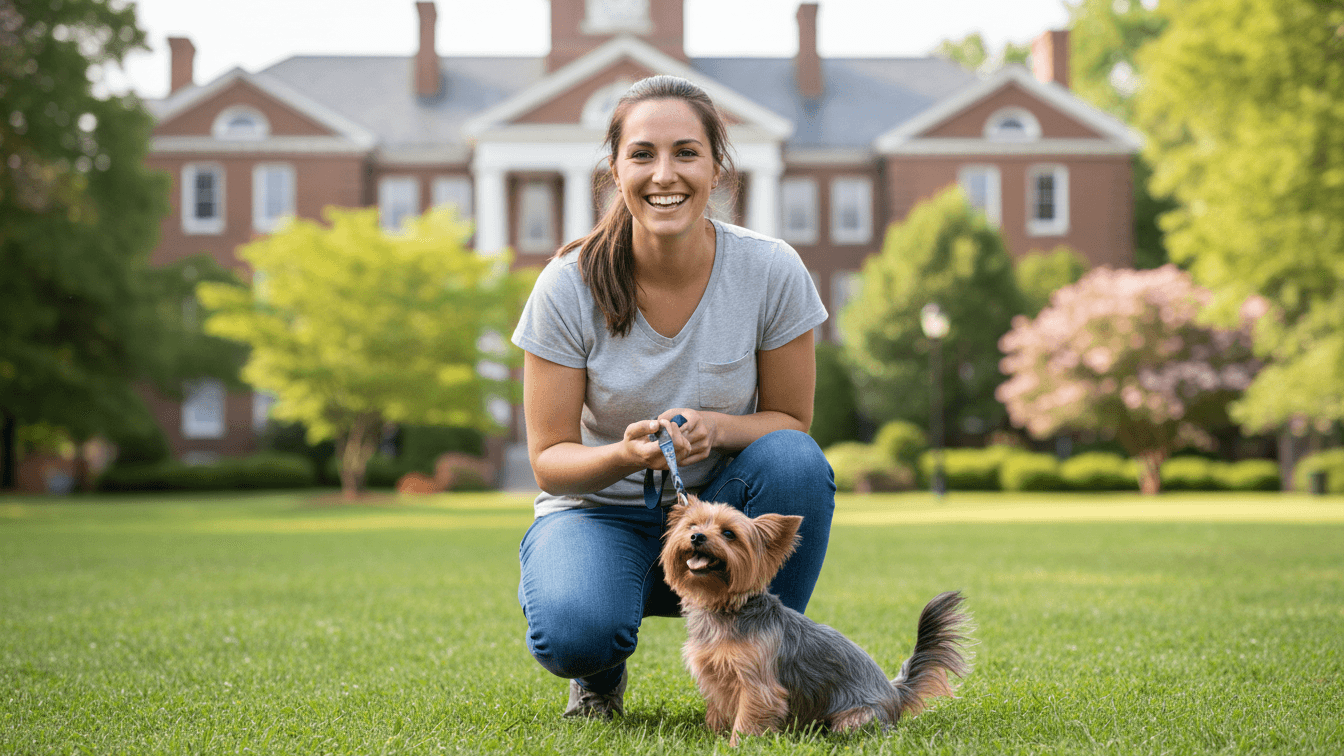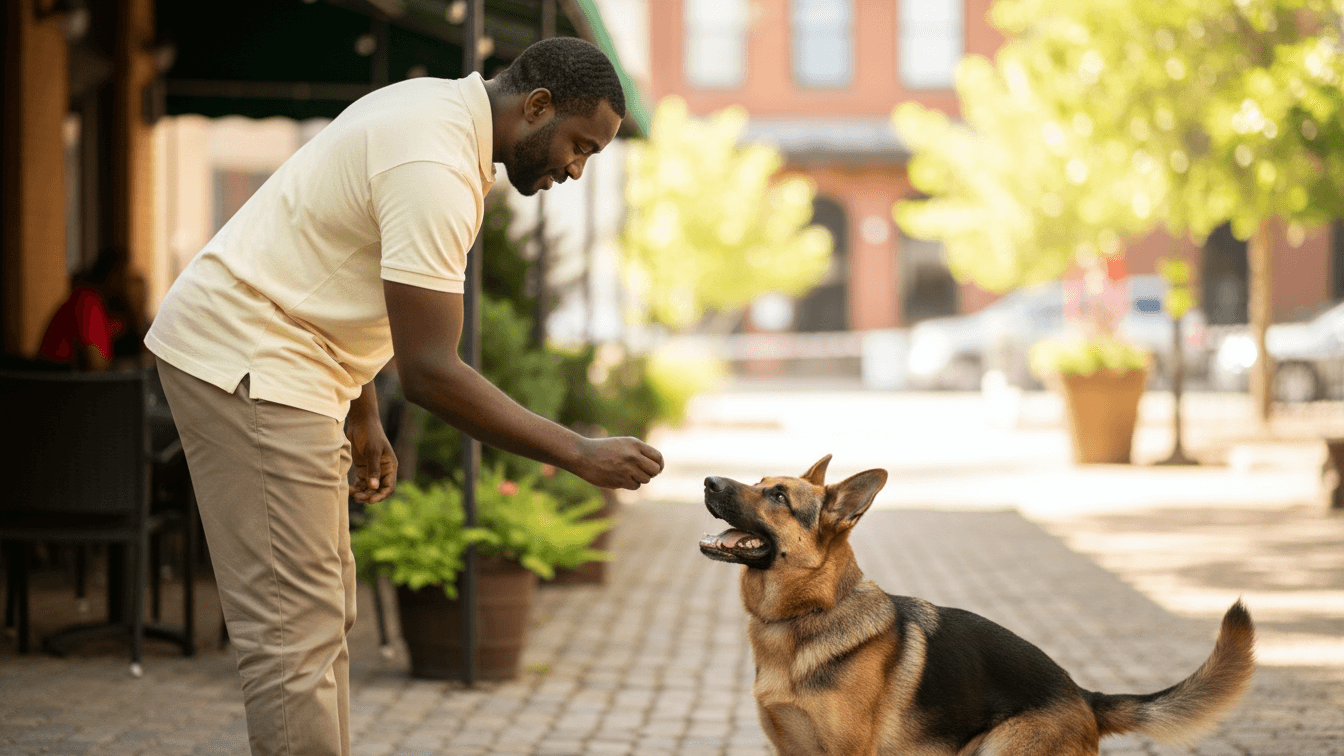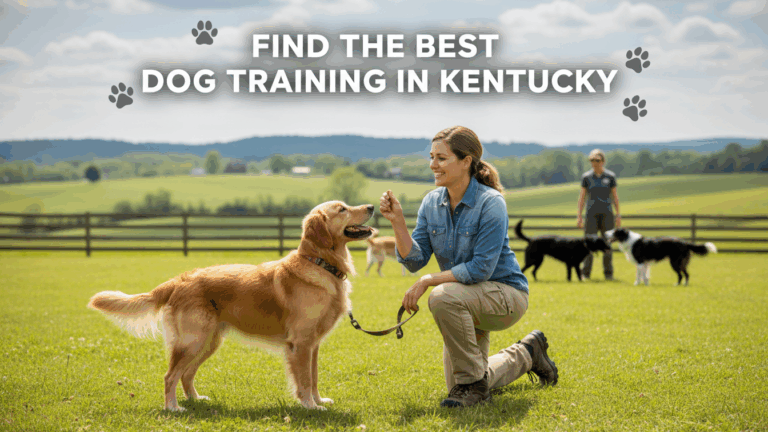Your Complete Guide to Choosing a Dog Trainer in Kentucky
Dog owners across Kentucky face unique training challenges, from navigating busy Louisville neighborhoods to managing recalls near Lexington horse farms, or preparing for quiet rural life in smaller communities. Whether you live in a major city like Bowling Green or a smaller town surrounded by farmland, your dog needs solid manners that fit your lifestyle.
Kentucky doesn’t require special licensing for dog trainers, so finding someone with proven credentials and humane methods matters even more. The right trainer will help your dog handle everything from downtown festivals to hiking trails at state parks, all while respecting local leash laws and community expectations.
How to Choose the Right Trainer
Start by looking for a professional dog trainer who uses positive reinforcement training methods and understands Kentucky’s mix of urban, suburban, and rural environments. Your dog should learn practical skills like walking calmly past horses, staying focused during county fairs, and handling vet visits without stress.
Credentials help you compare experience levels quickly. Look for dog trainer certifications like CPDT-KA, KPA-CTP, or IAABC-CDBC for behavior problems. If your dog shows serious aggression or fear, ask about CBCC-KA or science-based programs like CTC.
In-home dog training works best for puppy training, door manners, and neighborhood leash skills. Group classes make sense once your dog can focus around distractions, especially before visiting busy spots like Cherokee Park in Louisville or The Arboretum in Lexington.
Private lessons give you flexibility to address specific problems like reactivity toward livestock or separation anxiety when you head to work. Day training can speed up results if your schedule is packed, while board and train programs offer intensive work for dogs needing major behavior modification.
Common Dog Training Methods Explained

Reward-based methods build trust and create lasting changes without damaging your relationship. They also help you follow Kentucky’s animal control regulations about keeping dogs under control in public spaces.
Basic obedience covers sit, down, stay, place, recall, and leash training so your dog can handle walks through historic districts, restaurant patios, and community events without pulling or jumping on strangers. These foundation skills make daily life easier whether you live in an apartment complex or on acreage.
Puppy classes focus on socialization, potty training, bite inhibition, crate comfort, and early leash manners. Starting young prevents bad habits from forming and helps puppies adjust to Kentucky’s varied environments, from thunderstorms to livestock encounters.
Behavior modification addresses fear, reactivity, resource guarding, or separation anxiety through careful desensitization and counterconditioning. For serious cases, ask if your trainer works with local veterinarians who can evaluate whether medication might help alongside training.
Dog training classes provide structure for learning around other dogs and people. The best classes screen participants carefully, give dogs plenty of space, and teach calm behavior rather than just excitement and chaos.
Specialized training like service dog training or therapy dog training requires extra public-access skills, clear task work, and a structured training program that meets legal standards. Not every trainer offers this level of work, so ask about their specific experience.
Stay away from trainers who rely on fear, pain, or intimidation to get results. Humane methods are safer for everyone, easier to maintain long-term, and won’t create new behavior problems down the road.
Average Cost of Dog Training in Kentucky (Updated for 2025)
Dog training services across Kentucky vary based on location, trainer experience, session length, and whether you live in a major city or rural area. Here’s what most dog owners are paying in 2025.
| Service Type | Average Cost (Kentucky) |
|---|---|
| Puppy classes (4-6 weeks) | $140-$260 total |
| Group obedience training (4-6 weeks) | $150-$280 total |
| Private lessons (60-90 min) | $100-$180 per session |
| In-home coaching packages (4-6 visits) | $400-$850 total |
| Day training (trainer works your dog + handoff) | $425-$900 per week |
| Behavior consult for reactivity/anxiety (initial) | $140-$240 |
| Board and train (2-4 weeks) | $1,900-$4,200 total |
You’ll probably pay higher rates in Louisville, Lexington, and other larger cities compared to smaller communities. Expect additional travel fees if your trainer drives longer distances, and plan for higher costs when addressing serious aggression or complex behavior problems.
Make sure you understand what’s included in each package, how the trainer tracks progress, and whether they offer a free consultation or free evaluation before you commit.
Questions to Ask a Potential Dog Trainer
- What training methods do you use, and how do you keep training sessions positive and low-stress?
- What certifications do you hold, like CPDT-KA or KPA-CTP? Do you complete continuing education such as CPDT-KSA?
- How will you customize the training program for my dog’s specific needs and our Kentucky lifestyle?
- Do you offer in-home visits, dog training classes, or day training, and which approach fits my goals best?
- How will we measure my dog’s progress and know when to add more real-world distractions?
- What are the total costs, including any travel fees, and what’s your cancellation policy?
- Do you carry liability insurance, and can you show me proof?
- For behavior problems, will you work with my veterinarian if medication might help alongside training?
- What should I practice between our sessions to help my dog keep improving?
Local Kentucky Rules and Considerations
Kentucky’s animal control regulations are handled at the county and municipal levels, so specific rules vary depending on where you live. Most communities enforce leash laws and nuisance ordinances to keep public spaces safe and peaceful.
Leash laws are common throughout Kentucky, especially in city parks, downtown areas, and residential neighborhoods. Keep a standard 6-foot leash with you for walks and public outings, even if your dog has excellent recall.
Kentucky law requires current rabies vaccination for all dogs, and your dog must wear a rabies tag when in public. You can get vaccinations through county health departments, mobile clinics, or your regular veterinarian.
Excessive barking can be considered a nuisance under local ordinances, so work with your trainer on alert barking and separation anxiety before neighbors start complaining. If your trainer wants to use public parks for commercial training sessions, they may need permits and proof of insurance from the city or county.
Kentucky doesn’t require special licenses for certified dog trainers, but if a trainer boards dogs for payment as part of board and train programs, their facility must meet state kennel licensing requirements under Kentucky’s animal welfare regulations.
Many counties have animal control departments that handle licensing, lost pets, and bite reports. Check your local county government website for specific requirements and resources in your area.
Local Kentucky Resources for Dog Owners
These locations give you great spots to practice obedience training, work on socialization, and provide safe enrichment for your dog. Always follow posted rules and respect other visitors.
- Cherokee Park Dog Run in Louisville offers fenced areas where you can practice recalls and calm greetings. Visit during quieter times when you’re starting out.
- The Arboretum State Botanical Garden of Kentucky in Lexington welcomes leashed dogs on walking paths, perfect for building focus around other people and wildlife.
- Big Bone Lick State Historic Site in Union allows leashed dogs on trails, giving you opportunities to practice leash training around interesting smells and varied terrain.

FAQs
How much does in-home dog training cost?
Most Kentucky trainers charge $100-$180 per in-home visit, with package discounts available when you buy multiple sessions. Behavior problems like reactivity or aggression typically start at the higher end of that range.
Is in-home dog training worth it?
Absolutely, because you’re addressing problems exactly where they happen. Your trainer can fix door manners, jumping on guests, counter-surfing, and yard reactivity right at home, then step outside to practice leash skills on your actual neighborhood streets or rural roads.
Can you pay someone to house train your dog?
Yes, many expert dog trainers offer puppy programs that include potty training, crate routines, and daily schedules. Day training can speed up the process while teaching you how to maintain the progress after the trainer leaves.
What is the 3-3-3 rule for dog training?
This timeline helps set realistic expectations for new or adopted dogs: expect about 3 days for your dog to decompress, 3 weeks to learn your routines, and 3 months to feel completely settled. Good training programs work with this natural adjustment period rather than rushing results.
How long will it take to reach my training goals?
Most puppies and friendly adult dogs show solid progress within 4-8 weeks if you practice daily between training sessions. Fear, reactivity, or aggressive dog training typically requires several months of careful behavior modification with gradual increases in difficulty.
What should I bring to group classes?
Pack a flat collar or harness, a 6-foot leash, high-value treats, water, and current vaccination records if your trainer requests them. Leave retractable leashes at home for safety reasons.
What’s the leash law in Kentucky?
Leash laws vary by city and county throughout Kentucky. Most urban and suburban areas require dogs to be leashed and under control in all public spaces except inside designated off-leash dog parks. Check your local ordinances for specific rules in your community.
Do I need a dog license in Kentucky?
Some Kentucky counties and cities require dog licenses, while others only require proof of current rabies vaccination. Contact your county clerk or animal control office to find out what’s required in your area.
What shots does my dog need in Kentucky?
Kentucky law requires current rabies vaccination for all dogs. Your veterinarian may also recommend distemper-parvo, bordetella, leptospirosis, and Lyme disease vaccines based on your dog’s lifestyle and exposure risks. Talk to your vet about which vaccines make sense for your situation.
Are dog trainers required to be licensed in Kentucky?
No special trainer licenses exist in Kentucky. Dog trainers follow normal business regulations, but if they offer board and train services, their facility may need to be licensed as a boarding kennel under Kentucky’s animal welfare regulations.
Where can I practice off-leash recall?
Use fenced dog parks throughout Kentucky to keep training for dogs safe and legal. Practice during quieter hours when you’re starting out, and always supervise your dog closely around other animals.
Which dog parks allow training around Kentucky?
Most public dog parks allow you to work on recalls and socialization within their fenced areas. Cherokee Park Dog Run in Louisville, Jacobson Park Dog Park in Lexington, and Covington Dog Park in Covington all offer safe spaces for practice. Call ahead to confirm rules about training sessions inside the park.
What trails allow dogs for training?
Many Kentucky state parks and natural areas welcome leashed dogs on trails. Cumberland Falls State Resort Park, Natural Bridge State Resort Park, and John James Audubon State Park all allow leashed dogs on designated trails, giving you excellent opportunities to practice focus around wildlife and other hikers. Always check specific trail rules before visiting.
How do I find a well-behaved dog trainer near me?
Look for trainers with recognized certifications who use positive reinforcement methods and offer a free evaluation. Ask about their experience with your specific training goals and whether they’ve worked with dogs in environments similar to yours, whether that’s a busy Louisville neighborhood or a quiet rural property.
What if my dog has separation anxiety?
Work with a professional dog trainer who specializes in behavior modification. Separation anxiety requires careful desensitization and can’t be rushed. Your trainer may recommend working with your veterinarian to rule out medical issues or discuss medication to help your dog alongside the training program.
The right combination of thoughtful planning, humane methods, and consistent practice in Kentucky’s diverse environments will help your dog become a confident, well-behaved dog. Don’t hesitate to ask potential trainers about their credentials and how they stay current with new techniques through continuing education.
